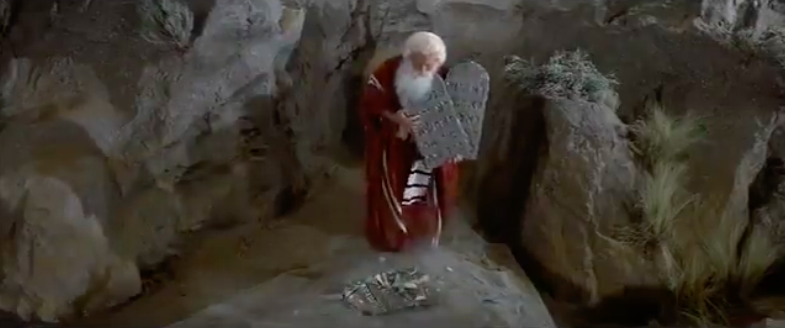Lately, Gov. Ned Lamont has appeared like Moses descending from Mount Sinai with God’s commandments in the Mel Brooks comedy, History of the World Part 1 – except he’s carrying toll proposals.
In the film, Moses walks down from the mountain holding three stone tablets, telling the Israelites that Jehovah has given him fifteen commandments for “all to obey.”
Until he drops one of the tablets. Then it’s only ten commandments for all obey.
Gotta go with the flow, right?
The shifting numbers from Lamont on how many toll gantries there will be and how much revenue will come from out-of-state drivers makes it seem like the governor might have dropped a tablet or two.
First, the number of gantries. Lamont has been all over the state and all over the media saying there will be no more than 50 tolling gantries.
Meanwhile, his own budget calls for 53.
Perhaps a minor difference but, when looked at in the context of the overall tolling debate, it’s indicative of how badly the entrenched political class in Hartford wants tolls.
The 2015 Tolling Study from CDM Smith called for between 78 and 121 tolling gantries. But that was too many for the public to stomach, and the Democrats’ push for tolls during the 2018 legislative session stalled out.
It was time to adjust.
So, Gov. Dannel Malloy and then Department of Transportation Commissioner James Redeker sent CDM Smith back to the drawing board, and they came back with 82 tolling gantries.
But, apparently, a map of Connecticut with 82 red dots representing gantries wasn’t a good look either, so Lamont scrapped that plan and came out with his own tolling proposal to put 53 gantries on the highways.
Now it’s down to 50 in the almost-daily communiques from both Lamont and his press team. Fifty is a nice, even number so it works better for the purposes of public persuasion.
Secondly, there’s the amount of revenue to be drawn from out-of-state drivers.
At first, the revenue from out-of-state drivers was pegged at 30 percent, according to the 2015 study by CDM Smith.
But that wasn’t enough to win over the public, so it was back to the drawing board for adjustments in how much in-state residents are charged using a Connecticut E-Z Pass, and they were able to increase that figure to 40 percent.
That should be good, right? Apparently not. At a press conference Tuesday, Lamont said “over half the costs would be born by out of staters and big tractor trailer companies.”
Catch that? Now it’s 50 percent of toll revenue from out-of-state drivers and trucks.
Then the Hartford Courant reported Lamont offered a compromise to Greenwich Republican Livvy Floren to keep tolls off the Merritt Parkway.
Of course, that would change revenue and cost assumptions even more.
And last, but not least, is Lamont’s offer to compromise on tolls and allow short-term borrowing to help fund projects — with the caveat that there must be tolls. Of course, he will need short-term borrowing anyway because his budget plan calls for bankrupting the Special Transportation Fund before tolls could conceivably be up and running and generating revenue.
In his letter to Republicans, Lamont says the toll rates will be frozen for three years, a tacit admission that toll rates were always going to increase once the gantries were in place.
Why all the shifting numbers? Because none of these estimates regarding the number of gantries, revenue and costs were ever written in stone. Rather, they have been political documents as subject to change as a dry-erase whiteboard.
Why all the shifting numbers? Because none of these estimates regarding the number of gantries, revenue and costs were ever written in stone. Rather, they have been political documents as subject to change as a dry-erase whiteboard.
If a particular aspect of the political push for tolls isn’t playing well, just wipe if off the board and rewrite.
Suffice to say, the revenue projections – and all the other projections made by both CDM Smith and lawmakers — are not solid numbers written in stone and handed down by the Almighty.
And that is something to be concerned about, especially when those lawmakers are trying to implement the most expansive tolling plan ever attempted in the United States and banking on $1 billion in additional revenue from drivers.
To quote Mel Brooks’ Moses when the stone tablet falls and breaks: Oy…


J.R. Heyel
May 13, 2019 @ 9:37 pm
Oy